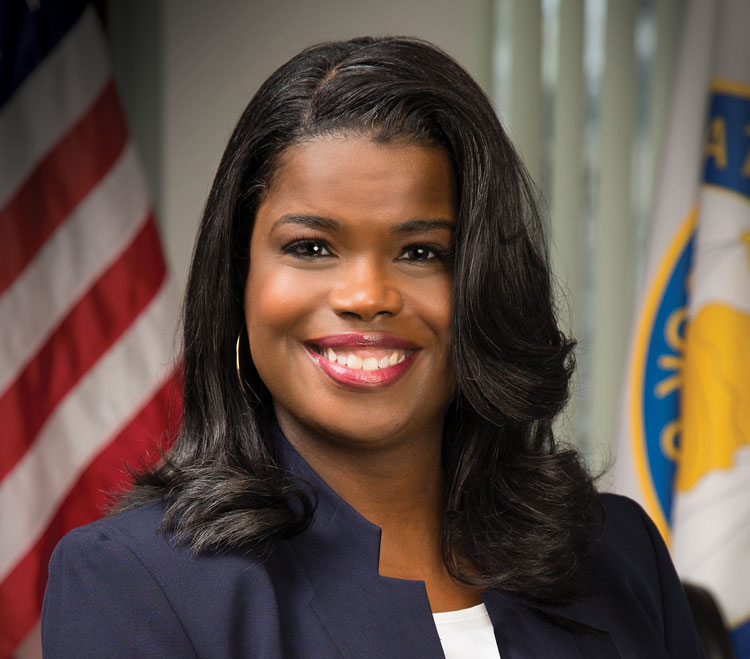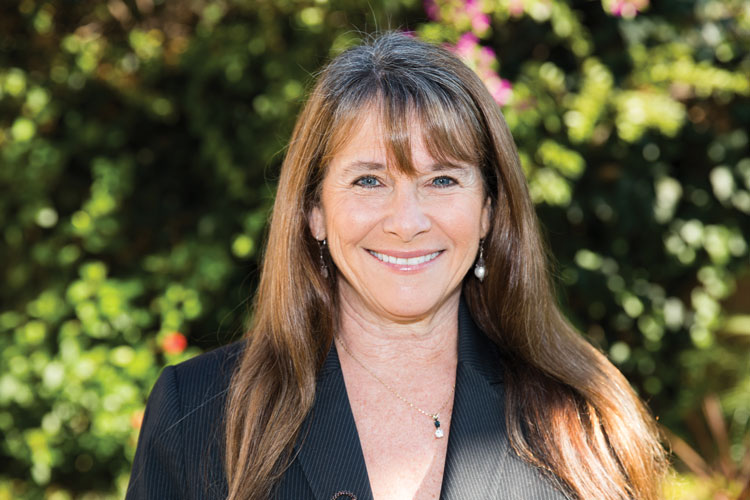How Black female prosecutors are challenging the status quo and fighting for reform

Image from Shutterstock.com.
Kim Gardner could not have predicted that the “perfect storm” she warned about four years earlier as a state representative in St. Louis would become an accurate description of the challenges she’s faced as the city’s first Black circuit attorney.
In 2016, Gardner, then a Missouri state representative, made the comment to colleagues when they voted to expand the so-called castle doctrine, allowing the use of physical force to defend property. Gardner was quoted in media reports saying, “We’re lowering the standard. We’re creating the perfect storm.”
In late July, Gardner brought felony charges against Mark and Patricia McCloskey, a white couple who had brandished a semiautomatic rifle and a semiautomatic handgun at Black Lives Matter protesters passing by their mansion the month before. The controversy that followed took center stage as America grappled with the fallout from historic nationwide protests.
Even while the investigation was still underway and before any charges were brought, the reaction was swift—against Gardner. It’s the sort of dynamic that has played out during her tenure as a Black female prosecutor—a member of a small cadre of top district attorneys across the country. This group has faced more scrutiny and second-guessing than their white or male counterparts. They’ve also been subjected to racist and violent threats and sexist attacks.
Unprecedented challenges
In Gardner’s case, after announcing the criminal complaint against the McCloskeys, along with the opportunity for diversion, which would mean no trial and no conviction record, Gardner began to receive racist hate mail and death threats. One of Missouri’s senators, its governor, the state attorney general, U.S. Attorney General William Barr and even President Donald Trump all questioned Gardner’s charging decision. Missouri Attorney General Eric Schmitt filed a brief seeking to dismiss the charges against the couple based on castle doctrine law.
Republican Sen. Josh Hawley of Missouri accused Gardner of abusing her power and asked Barr to launch a civil rights investigation. Gov. Mike Parson said he expected he would pardon the couple if convicted. The McCloskeys were given a prime-time speaking slot at the Republican National Convention. But on the other side, more than 65 current and former elected prosecutors, U.S. Department of Justice officials and U.S. attorneys signed a statement supporting Gardner.
The charges were filed against the McCloskeys 15 days before Gardner, a registered nurse and former prosecutor, faced voters in a primary election, which she ultimately won. But the race was tighter than her 2016 landslide victory, where she earned 47% of the vote in a crowded field. Gardner is one of the country’s few Black female chief prosecutors, and she swept into office as part of a wave of progressive DAs elected in response to a growing criminal justice reform movement.
“For so long, we’ve used the prosecutor’s office to perpetuate broken systems and flawed tough-on-crime rhetoric that has never been successful,” Gardner says. “When we talk about reform-minded prosecutors, we’re looking at how we can use innovative data to direct decisions of who we charge, what we charge and how we heal communities.”
The McCloskey case isn’t the first time outside prosecutors have had to support Gardner in the face of opposition from those within St. Louis’ judicial system. In 2019, Gardner sought to vacate the murder conviction of Lamar Johnson—who had been in prison since 1995—and grant him a new trial after an investigation found he was wrongfully convicted in a case marred by accusations of misconduct and witness bribery.
A circuit court judge denied Johnson’s release and appointed the state attorney general to intervene. A group of 45 elected prosecutors, Republicans and Democrats, from around the country filed a brief backing Gardner’s authority to challenge Johnson’s conviction of life without parole.
Several months before the McCloskey case, Gardner made headlines when she filed a federal civil rights lawsuit against the city of St. Louis and its police union accusing them of violating the Ku Klux Klan Act, which is designed to combat white supremacy organizations. The suit provides graphic detail of St. Louis’ long history of racial inequality and prejudice in the criminal justice system, which Gardner was elected on a promise to address. The complaint says the city and police union have mobilized to thwart those efforts and to “intimidate, silence and sideline” her “to prevent her from carrying out her duty to provide equal protection of the law to all.”
As the suit notes, the stakes are high.
“The people elected me to enact reform in the city of St. Louis. We have a lot of cronyism and racism concentrated in the city of St. Louis, and we’re ground zero for a lot of the reform conversations,” Gardner says. “The playbook starts in St. Louis, and it spreads to every reform-minded prosecutor in many different ways.”
When Gardner filed her suit in January, nearly a dozen Black female elected prosecutors issued a statement of support and several flew in from around the country to stand with her at a rally. Among them was Baltimore City State’s Attorney Marilyn Mosby.

Kim Foxx. Photo courtesy of the Cook County State’s Attorney’s Office.
Shifting the status quo
The death of Freddie Gray while in the custody of Baltimore police officers captured the nation’s attention five years before the killing of George Floyd in Minneapolis forced a national reckoning on race, justice and police-involved deaths. Gray died a week after his spine was partially severed during a “rough ride” in the back of a Baltimore Police Department van. Marilyn Mosby was the youngest top prosecutor in a major American city at the time, and had been in the job only a few months when she faced enormous political pressure not to prosecute the officers involved in the case.
When she did decide to prosecute, she was criticized for acting hastily—despite an almost three-week investigation and autopsy report declaring Gray’s death a homicide—as well as overcharging. The Hennepin County, Minnesota, district attorney cited the negative reactions in the Gray case when he was asked why he hadn’t pressed charges days after video of Floyd’s killing was seen around the world. Mosby and some of the other women interviewed point out that critics are quick to question the basic competency of Black female prosecutors—and they’re often damned if they do, damned if they don’t.
“What I learned early on is, you can’t internalize it. Our very presence challenges the status quo regardless of what we do,” she says. “I do not want the next prosecutor who looks like me to be discouraged from running.”
Inspired by 2020 Democratic vice presidential candidate Sen. Kamala Harris, who is also a former California attorney general, Mosby is, in turn, cited by her fellow progressive Black female prosecutors as an inspiration as well. She’s helped create a supportive network of her peers that she lacked when she first ran for office.
Kim Foxx was running for Cook County, Illinois, district attorney the year Mosby was prosecuting the Gray case and wanted to meet her. When Foxx won, Mosby went to Chicago and connected with her. When Foxx took office on Dec. 1, 2016, the honeymoon period lasted a whole two days before racist memes began. She’s also been targeted by white nationalist groups.
“It’s a constant. I don’t know that there’s not been a time that I’ve been in this position where I’ve not been the recipient of hate mail, hate speech, hate rhetoric,” she says. “It is vigorous, it’s relentless. And the lack of shame that the people who engage in this type of behavior have is actually quite astonishing, particularly in the social media space.”
Like Mosby and Gardner, Foxx is no stranger to high-profile cases. Shortly after Foxx was lauded for being the first jurisdiction to charge singer R. Kelly for aggravated criminal sexual abuse, she faced criticism over a perceived conflict of interest in the case of actor Jussie Smollett, who in January 2019 told police he was the victim of a racist and homophobic attack and was charged with lying about that attack.
Foxx released a statement that she was removing herself from all aspects of the investigation and prosecution. To ensure transparency, her office released more than 2,000 pages of documents in the case, but she has been plagued by the Smollett case ever since.
Foxx also faces reelection this year. In March, she beat three challengers in her primary race and won 50% of the vote.

State Attorney Aramis Ayala, center, answers questions during a news conference. AP Photo/John Raoux.
Uneasy path
Massachusetts’ Suffolk County District Attorney Rachael Rollins was targeted even before she took office: The National Police Association filed a state bar complaint against her alleging ethics violations . It’s hard to overstate just how extraordinary it is that a Black woman was elected the chief legal officer of a county that includes Boston, a city that still bears the scars of racial tensions inflamed by a notorious 1989 murder case where a white man lied to cover up the murder of his pregnant wife by claiming a Black man committed the crime.
As with her fellow Black female prosecutors, Rollins was swept into office on a wave of support for her progressive policies. She topped a crowded primary field with more than 40% of the vote before winning almost 80% of the vote in the general election. Less than six months after being elected, she released a 66-page policy memo outlining her office’s approach to everything from pretrial detention to data collection and analysis.
Like Mosby, Rollins was among the Black women who flew in from around the country to support Gardner when she announced her suit against the city of St. Louis and police union.
“We never do what’s easy; we do what’s right,” she says of her fellow Black female progressive prosecutors.
Though some of these prosecutors’ names have become familiar through high-profile cases, their work is much broader than that. When asked to point to a signature achievement, all of them mention accomplishments that can have lasting influence on their communities. Mosby points to use-of-force and de-escalation polices that have been implemented on her watch.
Foxx cites conviction integrity work that has positively impacted more than 100 people and the fact the criminal justice system has now done right by people it previously harmed.
Rollins mentions a discharge integrity team, which she believes is the first in the nation. It’s an outside group tasked with reviewing officer-involved fatal shootings and includes a member of the community, a member of law enforcement, a criminal defense attorney and a retired superior court judge.
These reformist programs would have been radical just years ago—when prosecutors were all about “law and order” and harsh sentencing. Now, particularly in the wake of protests for racial equality, it’s mainstream to talk about systemic racism, police accountability and rolling back policies that impact communities of color disproportionately.
Foxx says it’s validating to know Black women prosecutors who had been raising these issues were on the right track, but it’s also frustrating that they were attacked for their ideas. As Gardner notes, communities can’t use 18th- or 19th-century approaches to 21st-century problems. Focusing prosecutorial resources on violent crime, rather than low-level crime, is a priority. Rollins says it’s a matter of thinking creatively about solutions.

Miriam Krinsky. Photo courtesy of Fair and Just Prosecution.
Clear mandates
The racism and sexism endured by Black female prosecutors, along with the criticism of how they use prosecutorial discretion, adds layers of challenges to a job that aren’t faced by their male counterparts. The prosecutors interviewed described how being Black and female has been used by some critics to alienate and dehumanize them.
Former Assistant U.S. Attorney Miriam Krinsky is executive director of Fair and Just Prosecution, a nonprofit that convenes gatherings of newly elected progressive prosecutors, says these women have a mandate that should be respected.
“They did not wake up one day and decide the criminal justice system has it wrong. Communities are waking up to that conclusion,” says Krinsky. “They are not rogue leaders. Those who push back are pushing back on the will of the community. By attacking them, critics are attacking the communities that empowered them and put them into these communities to do these jobs.”
Between 2015 and 2019, the share of elected prosecutors in the U.S. who are women of color has barely increased—from 1% to 2%, according to the Reflective Democracy Campaign. Not surprisingly, many of these women have formed close and supportive friendships that help them navigate everything from the unprecedented challenges they face in office to how to shield their families from the sexism and racism they endure for doing their jobs. They say they rely on their families, their faith and their strong friendships with one another to deal with the attacks.
All of them speak with passion and purpose. “I’m here for a reason: to ensure a fair and equitable system,” Mosby says.
Foxx agrees: “It’s not activism per se; it’s representation,” she says. “I think we’ve been unapologetic about showing up in the fullness of ourselves and having hard, truthful conversations about the state of the justice system, particularly as it relates to race, and feeling an urgent and affirmative responsibility to do something about it.”
But the stress of the near-constant scrutiny, undermining and attacks has its consequences. The women interviewed share stories of repeatedly being called the N-word, monkeys or bitches and also having their families—included their children, mostly girls—targeted by racist comments and calls for violence against them.
The women don’t shy away from calling attention to the abuse they receive. Mosby posted on social media a voicemail she received in which the caller said, “If we’d known you all were going to be this much f- - -ing trouble, we would have picked our own f- - -ing cotton.”
Gardner has also posted examples of hate mail she’s received, both letters using the N-word and one that begins, “I hope the KKK gets you and strings you up from the biggest oak tree!” Someone called for a #foxxhunt of Kim Foxx and a blog has posted her home address along with a suggestion that criminals should visit her and her children. And a noose was sent to the office of Aramis Ayala, Florida’s first Black state’s attorney.

Illustration by Sara Wadford.
Ayala faced a further unprecedented outrage: She had to testify in a federal court case about a resident’s right to urge she should be lynched. A county clerk of courts employee who made the comment on social media was fired and sued, claiming his First Amendment rights were violated.
Ayala, who has been an inspiration to other newly elected progressive prosecutors, has chosen not to seek reelection. But she makes clear it wasn’t racism that drove her out: “The death penalty,” she says. “When it comes to the death penalty, there are a lot of conversations and people say things in a cavalier way until it’s your signature that starts the wheels of death rolling.”
Her authority to not charge capital cases was challenged by two Florida governors, Rick Scott and Ron DeSantis, who removed her from high-profile murder cases over her objection to the death penalty—something that rarely happens, as prosecutors generally have total discretion. Ayala went to court to challenge Scott’s actions but ultimately lost the case. As a result, she appointed a panel within her office to prosecute capital cases.
Ayala says she’s evaluating opportunities and will decide her next move in the coming months. Though she dreamed of being a prosecutor since fifth grade, she says leaving the office when her term expires does not mean the end of her fight for justice.
“I didn’t run for me. I ran for the people. I ran for change,” Ayala says. “When you’re anchored in something bigger, you continue.”
See also:
ABA Journal: “Change Agents: A new wave of reform prosecutors upends the status quo”
ABAJournal.com: “6 Prosecutors Changing the Paradigm”



